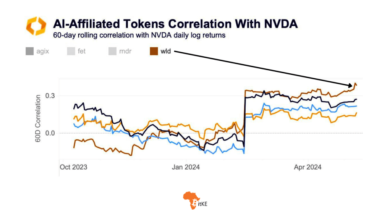Artificial Intelligence – AI Update, May 10, 2024: AI News and Views From the Past Week

Catch up on select AI news and developments from the past week or so (in no particular order):
Fei-Fei Li’s Spatial Intelligence Startup: Fei-Fei Li, a leading figure in AI research, is developing a startup focused on “spatial intelligence,” which aims to enhance how AI understands and interacts with three-dimensional environments. This technology seeks to enable AI to process visual information in a way that mimics human reasoning, potentially transforming various applications from robotics to augmented reality.
Importance for marketers: For marketers, this advancement presents opportunities for creating more immersive and interactive customer experiences. Spatial intelligence could revolutionize interactive marketing campaigns, offering customers a more engaging and intuitive interaction with products and spaces.
Apple’s AI Strategy: Apple is aggressively pushing into AI, with Tim Cook highlighting significant investments in generative AI technologies aimed at enhancing Apple devices. Unlike its rivals that are investing heavily in data centers, Apple is focusing on integrating AI into its software and services efficiently, suggesting upcoming features that could transform user interactions with Apple products.
Importance for marketers: Marketers should pay attention to Apple’s AI enhancements as they will likely offer new ways to engage users on Apple platforms through personalized and smarter interactions. This could be crucial for optimizing marketing strategies on iOS devices, potentially leading to higher engagement rates and more effective targeting within the Apple ecosystem.
Japan’s Global AI Regulation Framework: Japanese Prime Minister Fumio Kishida has unveiled an international regulatory framework for generative AI, aiming to promote safe and ethical use globally. This initiative, known as the Hiroshima AI Process, seeks to establish standards and guidelines that address the potential risks and enhance cooperation among nations in the development of AI technologies.
Importance for marketers: This regulatory framework could significantly impact how marketers use AI globally, emphasizing the need for compliance with international standards. It may lead to more standardized AI practices and tools that marketers can reliably use across different regions.
Microsoft Bans Police Use of AI for Facial Recognition: Microsoft has updated its policies to explicitly ban US police departments from using its Azure OpenAI Service for facial recognition. This policy revision is part of broader efforts to ensure ethical use of AI technologies, preventing misuse in law enforcement, particularly in uncontrolled environments like body and dash cameras.
Importance for marketers: Marketers in the technology sector should be aware of these ethical considerations and regulatory changes as they may influence public perception of AI technologies. Demonstrating commitment to ethical standards can enhance brand trust and customer loyalty.
Microsoft’s Responsible AI in Transparency Report: Microsoft has released its inaugural Responsible AI Transparency Report, detailing its efforts to develop AI responsibly. The report highlights the creation of 30 new AI tools, expansion of the responsible AI team, and implementation of safety measures throughout the AI application development process.
Importance for marketers: For marketers, Microsoft’s focus on responsible AI highlights a growing consumer demand for ethical technology solutions. Marketing strategies that emphasize a brand’s commitment to responsible AI can attract customers who are increasingly conscious of ethical considerations.
New Gadgets Imagine a Future Beyond Phone Screens: Innovative gadgets like Apple’s Vision Pro mixed reality headset, Samsung’s Galaxy Ring, and other AI-driven devices are shifting focus from traditional screen-based interaction to more integrated, wearable, and immersive experiences. These technologies are designed to reduce screen time and offer new ways of interacting with digital content.
Importance for marketers: These advancements present new channels and platforms for marketers to explore, particularly in creating immersive and engaging experiences. Marketers should consider how these devices might change consumer behavior and open up new possibilities for product interaction and advertising.
Microsoft’s New AI Model to Compete With Google and OpenAI: Microsoft is developing a new AI language model, MAI-1, to compete with major players Google and OpenAI. Managed by Mustafa Suleyman and intended to be far larger than earlier models, MAI-1 aims to push the boundaries of AI capabilities and market competition.
Importance for marketers: This development indicates a significant shift in AI capabilities that marketers should monitor. The evolution of AI tools can lead to more sophisticated data analysis and customer interaction tools, enhancing targeting and personalization strategies.
OpenAI’s Tool to Detect DALL-E 3 Images: OpenAI is launching a detection tool designed to identify images generated by its DALL-E 3 model. This tool aims to address concerns about the misuse of AI-generated content, especially in sensitive areas like elections, by ensuring the authenticity and traceability of digital content.
Importance for marketers: For marketers, the ability to verify the authenticity of AI-generated content is crucial, especially in maintaining trust in digital marketing campaigns. This tool could become an essential part of ensuring content integrity and compliance with emerging digital ethics standards.
Dotdash Meredith’s Content License Deal with OpenAI: Dotdash Meredith has entered a content license agreement with OpenAI, allowing ChatGPT to utilize summaries from its vast media holdings. This deal highlights the growing intersection of AI and digital content industries, emphasizing the importance of proper attribution and compensation for content creators.
Importance for marketers: This partnership illustrates the potential for new forms of content monetization and distribution. Marketers should consider how AI can be used to enhance content reach and engagement while respecting intellectual property rights.
OpenAI Develops ChatGPT Search Feature: OpenAI is enhancing ChatGPT with a search feature that could rival traditional search engines, such as Google. This feature aims to provide ChatGPT with the capability to fetch and cite information from the Web, potentially changing the dynamics of how users interact with search technologies by offering direct answers with source citations.
Importance for marketers: Marketers should prepare for shifts in search engine optimization and content strategies to capitalize on this new AI-driven query handling, which could alter traffic patterns and user engagement.
OpenAI’s Plan to Flag Deepfakes Before Elections: OpenAI has launched a tool designed to detect deepfakes, particularly targeting the spread of misinformation during election times. While it shows high efficacy with images from DALL-E 3, it struggles with content from other AI models, highlighting challenges in effectively managing AI-generated misinformation.
Importance for marketers: This tool underscores the need for marketers to ensure content authenticity and transparency, critical in maintaining trust in an era increasingly dominated by AI-generated content.
Apple Develops AI Chips for Data Centers: Apple is reportedly developing specialized AI chips for data centers, known as Project ACDC (Apple Chips in Data Center). These chips are intended to run AI inference tasks more efficiently, reflecting Apple’s strategic move towards enhancing its AI capabilities internally.
Importance for marketers: Apple’s move into custom AI chip development could lead to faster and more efficient AI processes, affecting how marketers manage and deploy AI-driven campaigns, particularly those relying on quick data processing and real-time personalization.
TikTok to Label AI-Generated Content: TikTok plans to implement new measures to label content generated by AI, using a digital watermark known as Content Credentials. This initiative aims to maintain transparency and combat misinformation by clearly identifying AI-generated videos and images, especially as concerns grow over AI’s role in influencing public perception during elections.
Importance for marketers: Marketers using TikTok for promotions should be aware of these labeling requirements, as they could affect how content is perceived and trusted. Ensuring compliance with TikTok’s guidelines will be crucial for maintaining credibility and effectiveness in campaigns.
Elon Musk’s AI Startup Nears $18 Billion Valuation: Elon Musk’s AI startup, xAI, is approaching an $18 billion valuation with its latest funding round, signaling strong investor confidence in its potential to compete with leading AI firms like OpenAI and Google. xAI aims to leverage data from Musk’s social platform, X (formerly Twitter), to enhance its AI models, focusing on delivering more accurate and insightful AI outputs.
Importance for marketers: The growth of xAI underscores the increasing importance of integrating AI into business strategies. Marketers should monitor developments from xAI for potential new AI tools and platforms that could revolutionize customer engagement and analytics strategies.
Siri for iOS 18 to Gain Massive AI Upgrade via Apple’s Ajax LLM: Apple is enhancing its system applications, including Siri, Safari, Spotlight, and Messages, with the Ajax large language model (LLM) in iOS 18. This upgrade will introduce sophisticated AI features, including smarter response generation, text summarization, and enhanced search functionalities—all processed directly on the device to maintain privacy.
Importance for marketers: The enhancements in iOS 18 present new opportunities for deeper user engagement and more tailored marketing strategies within Apple’s ecosystem. The ability to employ improved AI functionalities means marketers can better personalize content and interactions, potentially increasing conversion rates and user satisfaction.
Elon Musk’s Grok Will Get All Its News From X: Elon Musk’s new project, Grok, will source its news content exclusively from X, using AI to summarize discussions and social commentary found on the platform. This unique approach aims to create real-time news summaries that blend user-generated content with AI analysis, despite challenges such as filtering out misinformation and detecting sarcasm. Grok’s method reflects a novel way of processing and presenting news, relying heavily on social media dynamics.
Importance for marketers: Grok’s model indicates a shift toward AI-curated content from social media, suggesting marketers should craft clear, compelling messages that resonate well in AI summaries to enhance visibility and impact.
You
can find last
week’s AI Update here.
Editor’s
note: GPT-4 was used to help compile this week’s AI
Update.



